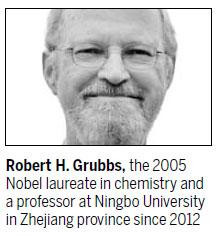
Robert H. Grubbs, the 2005 Nobel laureate in chemistry, believes that Chinese scientists will win a Nobel Prize before 2033, given the country's investment in research and development.
"After the 1960s, the United States invested a lot in education and research. Thirty years after, many scientists won Nobel Prizes, including myself," Grubbs said. "I believe after 20 years, if not sooner, many Chinese scientists could win Nobel Prizes because China made a significant amount of investment in education and technology in recent years."

Grubbs, a professor at Ningbo University in Zhejiang province since 2012, was attracted by the Recruitment Program of Foreign Experts (2011-20), which aims to recruit 1,000 foreign professionals to enhance China's development.
"I love Chinese food, and enjoy working with Chinese scientists," said the 71-year-old, who was born into a farm family in Kentucky.
The US chemist first visited China in 1980 when China opened its doors to the outside world. He has been in China often in recent years and said he was "amazed" by the rapid progress it is making.
Given China's rising importance in the world, everyone loves talking about the country, including the city Grubbs works in, he said.
"Ningbo is a great city. When I was in Hong Kong, even in my small town of South Pasadena, if I mentioned Ningbo, people joined my conversation and praised businesspeople from Ningbo."
His son, Barney Grubbs, who is also a chemistry professor and polymer scientist, also works for Ningbo University now.
The senior Grubbs co-organizes the annual Grubbs Symposium on Polymers and Green Chemistry, which brings top researchers to Ningbo and the Ningbo University.
He also advises the Grubbs Institute at Ningbo University's School of Materials Science and Chemical Engineering.
Chen Zhongren, dean of the school and a former PhD student under Grubbs, said China needs foreign experts such as Grubbs to catch up with global research levels in the fields of catalyst technology and high performance polymers.
"Bob has many great achievements in these fields. Eighty of the world's top 100 pharmaceutical companies are using a catalyst named after him, and Grubbs' catalyst is also widely used in chemical, energy and other industries," Chen said.
"Bob, Barney and I make a great team. Together we have guided more than 10 young scientists to do research in polymer synthesis and polymer physics. Any breakthrough in the above fields will lead to great progress in green materials and new energy sectors," he said.
"Polymer scientists at Ningbo University are outstanding and have chosen significant problems for study. College students are quite eager to learn," said Grubbs.
"If I have one wish, it is a PhD program in chemistry and polymer materials. We need PhD students to carry out our research projects, and China needs young talent being trained at Ningbo University."
Copyright ©1999-2018
Chinanews.com. All rights reserved.
Reproduction in whole or in part without permission is prohibited.